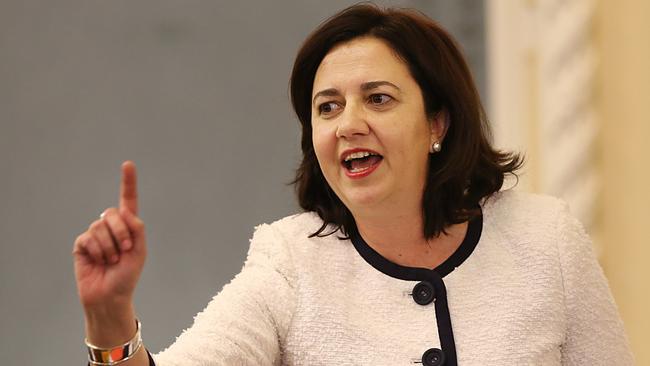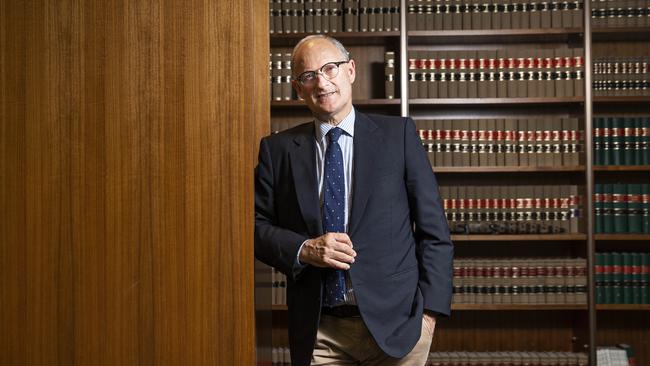Politics has no place in the Queensland euthanasia debate
The Queensland experience marks an important shift on voluntary assisted dying. In her haste, Palaszczuk has made this an issue for us all.

When Annastacia Palaszczuk dropped euthanasia into the Queensland election mix, it was a defining moment in the national discourse. No ifs, no buts — a re-elected Labor government would make voluntary assisted dying its first order of business in the New Year and put legislation before parliament. The implications of the Premier’s surprise move are only now emerging.
Australia is approaching a tipping point on VAD. Queensland will become the third state, after Victoria and Western Australia, to set up a system to help terminally ill people end their lives, with Tasmania set to follow in early 2021 and South Australia also exploring assisted dying legislation.
The momentum seems irresistible. Like Canute, the churches and anti-VAD lobby are powerless to stem the tide. But let’s not forget the nation’s first right-to-die regimen in Victoria is only 18 months old and barely tested, with the ramifications yet to unspool.
The issue was supposed to be above politics and partisan carry-on. Parliamentary inquiries were conducted in Victoria and WA in which MPs spoke from the heart and voted their conscience after exhaustive debate on government-sponsored bills.
Palaszczuk’s actions, however, have needlessly traduced the process in the Sunshine State, with national connotations. Her haste and naked self-interest stand in stark contrast to how parliament was supposed to deal with this most elemental of questions.
As it stands, a VAD bill of yet unknown properties will be introduced in February with utter certainty of passing. Even the most ardent supporters of euthanasia reform are appalled, fearing that public confidence in the future law will be damaged.
Unlike the other states, Queensland has no upper house of parliament to apply the brakes so the legislation can be meaningfully reviewed and, if need be, amended. The Labor government was returned with an increased majority on October 31, 13 days after Palaszczuk blindsided both her own party and the electorate at the setpiece ALP campaign launch, guaranteeing the numbers to carry the bill. The small number of ALP MPs who might peel off and exercise their conscience to join the weight of Liberal National Party members expected to vote “no” cannot alter the outcome.
Ostensibly, the process Palaszczuk established mirrors the pathways trod by her Labor counterparts Daniel Andrews in Melbourne and Mark McGowan in Perth, touted as best-practice to give MPs and interest groups the fullest opportunity to be heard.
In practice, it is nothing of the sort. True, the pros and cons of assisted dying were raked over in laudable detail by a parliamentary inquiry that sat in Brisbane and took to the road to hear evidence from doctors, pro-VAD groups, the churches and, most movingly, those with the most skin in the discussion — people confronting a terminal medical diagnosis or who cared for a dying loved one.
But the overseeing committee of just six MPs turned out to have the say that counted most. In a majority decision in March — the two LNP members dissented — it backed VAD and tasked the Queensland Law Reform Commission to develop the legislation in line with interstate practice and the process Palaszczuk had used to decriminalise abortion in 2018.
Then came another peculiarly Queensland twist. The committee also referred to the QLRC model VAD legislation drafted by two former law reform commissioners, Ben White and Lindy Willmott, both law professors with the Queensland University of Technology. The commission was given until March 1 next year to report using the White-Willmott template to underpin the work.
Remember, this all took place in the absence of substantive debate in parliament or a resolution from the house on whether Queensland should proceed with perhaps the biggest reform its 93 members would ever consider. At that juncture, Labor mustered 48 MPs for a narrow parliamentary majority — against 52 now — with additional support available from an expanded team of two Greens. In 2018, abortion law reform had been carried comfortably on a conscience vote, 50-41.
Until she came out at the ALP campaign launch on October 18, Palaszczuk had been careful to avoid stating a personal preference on VAD, despite referencing the “beautiful but horrific” death of her paternal grandfather, Leo, a survivor of World War II Nazi slave-labour camps. As recently as July, her office insisted to this newspaper: “The Premier believes the issue is intensely personal and deeply sensitive and will make her decision, having heard and considered all views, when the laws come before parliament.”
Now she was talking up urgent action. “It’s been raised with me countless times,” Palaszczuk said on October 19, pressed by puzzled reporters on why she had injected euthanasia into the hurly-burly of the campaign. If the lightly staffed QLRC needed extra resources, the help would be there to meet the new deadline. “It’s a very, very important issue that people discuss for their end-of-life care,” she said. “And yes, I would vote for it.” The problem was that the commission was struggling to hit the original March 1 reporting date, and advocates from both sides — the churches and pro-VAD groups such as Dying with Dignity Queensland and the Clem Jones Group — were picking up hints that the agency was considering approaching the government for an extension, so heavy was the workload.
Chairman and Queensland Supreme Court judge Peter Applegarth said recently that while the QLRC was “required to have regard” to the White-Willmott model, it was also assessing the existing frameworks in Victoria and WA alongside a heavily subscribed round of public submissions that closed only on November 27, outlining the competing views on how Queensland’s law should be framed.
Asked this week whether the QLRC had sought more time, Applegarth said: “The timing of the … report has been the subject of ongoing and constructive discussions between the commission and the newly appointed Attorney-General. The commission has been consulting with the government about a realistic reporting date.”
Palaszczuk is yet to justify the need for such haste. As Melbourne QC Paul Santamaria puts it: “If the legislation is good or meritorious, it will be as good in May as it is in February.”
The Premier’s office won’t be drawn on whether she stands by the accelerated timetable when it remains logistically fraught. In addition to the potential logjam of the QLRC, state parliament does not return from the Christmas break until February 23 and then sits only three days before adjourning to March 9.
Playing politics with a matter, quite literally, of life and death is hardly a good look, but the suspicion lingers that is precisely what Palaszczuk did while going for a historic third term. Polling conducted by the Clem Jones Group in mid-2019 suggested that up 82 per cent of Queenslanders supported the measure, an electoral temptation for Labor when LNP policy was to oppose it.

At the midpoint of the short, sharp 26-day election campaign, Labor was jittery about its prospects in the restive Queensland regions, where the federal party under then leader Bill Shorten had taken a well-documented bath in 2019. Published opinion polls showed the state ALP was struggling in the key battlegrounds of Townsville and the Cairns northern beaches, though not to the extent it had feared.
The strategy for Labor was to offset its anticipated losses in the north and possibly on the central Queensland coast (which did not eventuate) with gains either side of Brisbane on the Sunshine Coast and Gold Coast. One school of thought is that Palaszczuk was pitching to retirees clustered in LNP-held Caloundra, north of the capital, where longstanding MP Mark McArdle, a member of the parliamentary committee on VAD and end-of-life care, was retiring, and Currumbin on the Gold Coast, which had gone close to being picked up by Labor at a by-election in March. Labor won Caloundra and again pushed the LNP in Currumbin, while strengthening its hold on nearby Gaven, a big hope for the blue team. “I wouldn’t characterise assisted dying as anything like decisive for us, but it played to our overarching messages on health of protecting people from COVID and on jobs,” one Labor insider says.
Palaszczuk is now in a bind of her own making, with no palatable way to walk back her promise to go with legislation in February. To retreat is to face accusations of breaching an election commitment and the more tricky questions about why she pushed fastforward in the first place.
Yet to proceed is no less problematic, assuming it is possible, as veteran VAD advocate Everald Compton made clear on Thursday when he warned it would be a “great mistake” to rush. His intervention is noteworthy.
A founding figure in the influential National Seniors Australia organisation and promoter of very fast train travel, among other interests, Compton, 89, can open doors on all sides of politics. “We want everyone to have confidence in the process, to believe the legislation went through after a fair and legitimate debate,” he says.
“We are confident that it is going to go through: I would be quite stunned if it doesn’t go through. So there is nothing to be gained by rushing it. Let it take its course on the original timeline, with the law reform commission reporting in March, and if they need more time, as I understand they do, well, give it to them.
“We believe a voluntary assisted dying law has a greater chance of community acceptance if it is done correctly, and what I have said to the Premier’s people … is that she made a mistake on the campaign trail and there is no point magnifying it.”
Melbourne-based Santamaria, the 63-year-old son of the late Catholic polymath Bob Santamaria, is a chip off the old block in arguing that the fight is no lost cause.
In a submission to the QLRC on the White-Willmott bill, he said the example legislation “privatises death” by delegating the process to the “practically unfettered discretion” of doctors, acting from start to finish behind closed doors. He said the proposed safeguards were an “unenforceable joke” when the state’s only involvement was “checking that the paperwork has been correctly completed.”
Willmott rejects this, insisting that the protections in their model are more extensive than most other legislative frameworks here and abroad, backed by a “growing body” of empirical evidence that the rights of vulnerable people, especially the elderly, can be preserved. Pointedly, she says critics such as Santamaria, a committed Catholic, need to be “transparent about their values”.
What’s clear is that the Queensland experience marks an important and deeply symbolic shift on VAD. Like it or not, the debate has turned to how voluntary assisted dying is to be made the law of the land, rather than if it is to be embraced.


To join the conversation, please log in. Don't have an account? Register
Join the conversation, you are commenting as Logout